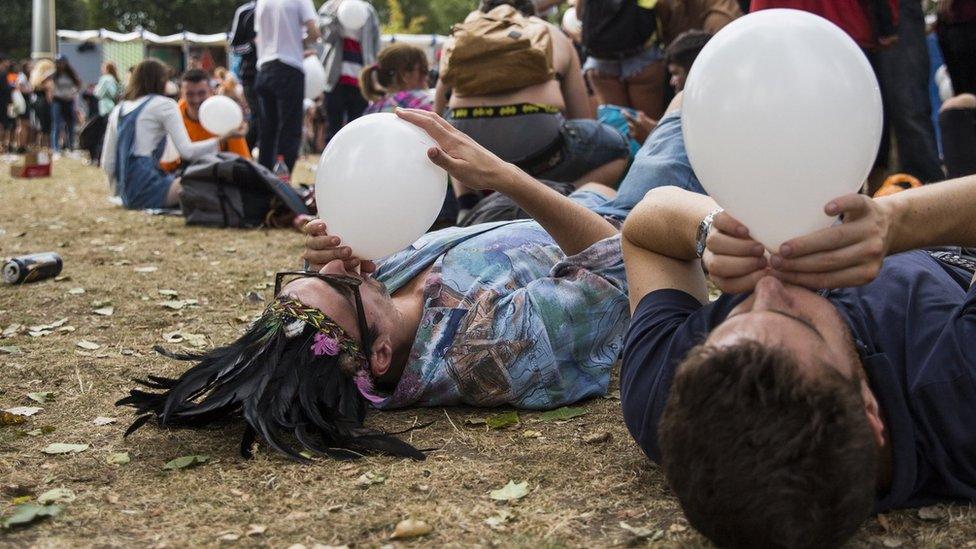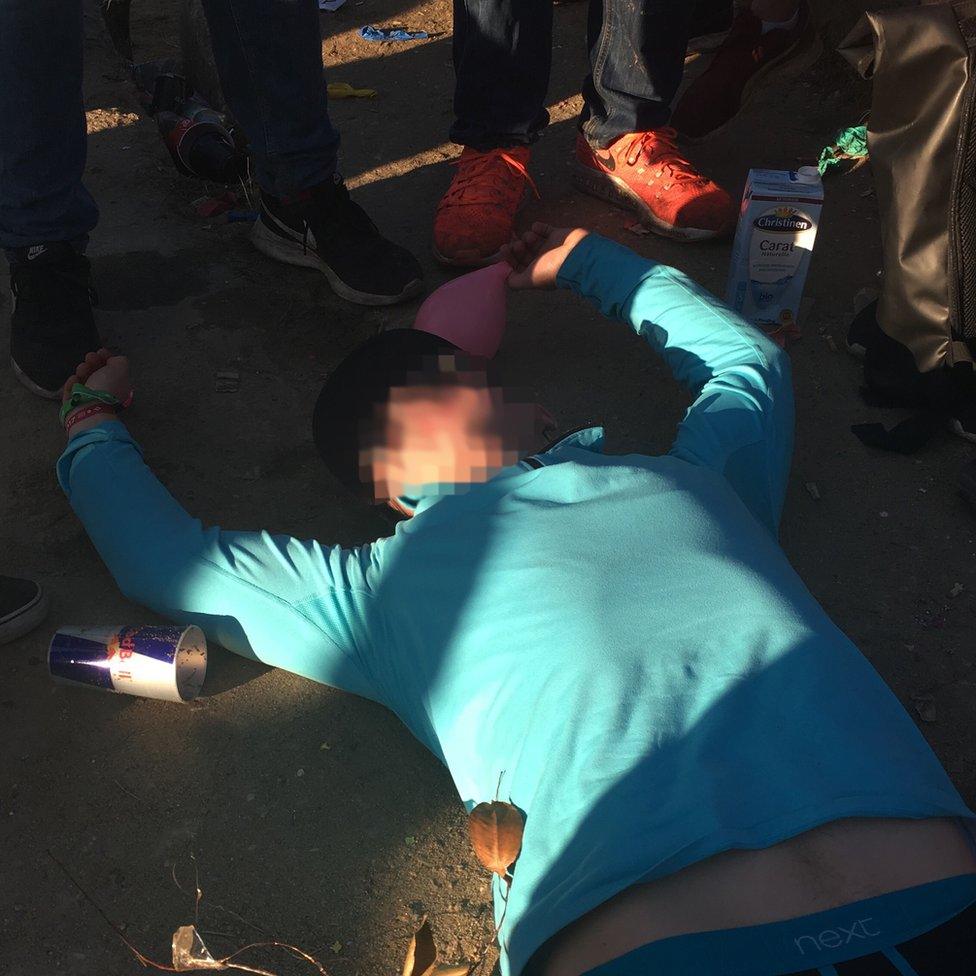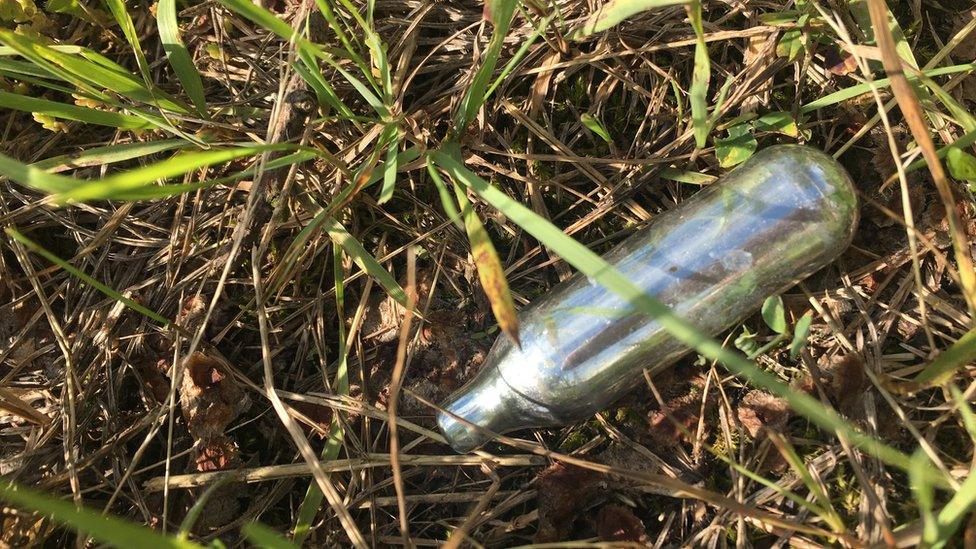Laughing gas sales balloon on Dutch party scene
- Published

Revellers inhale the gas from balloons - it can distort sound, create feelings of euphoria or trigger a headache
Wholesalers in the Netherlands say that in the past two years there has been a 400% rise in sales of nitrous oxide, more commonly known as laughing gas.
New companies selling the small bullet-shaped canisters are popping up online, but there are concerns about the risks in taking the increasingly popular legal high. The BBC's Anna Holligan investigates.
The pungent scent of marijuana wafted through the summer air outside Rotterdam's reggae festival.
The Netherlands is famous for its traditionally relaxed attitude towards soft drugs.
"I'm looking for laughing gas," I call out.
"I'll give you laughter for free," joked one dreadlocked man, rolling a joint.
But this wasn't the place to find nitrous oxide. It's popular among clubbers and often used in combination with other drugs like MDMA (ecstasy) or ketamine.

What are the effects of nitrous oxide?

A user intoxicated by laughing gas
It's a depressant-type drug, which slows down your brain and your body's responses.
The effects include:
Feelings of euphoria, relaxation and calmness
Dizziness, difficulty in thinking straight and fits of giggles or laughter
Sound distortions or even hallucinations
In some people, a headache

The reggae crowd recommended ordering it online - or buying it in Blokker. Could the most popular Dutch hardware chain be supplying a legal high?
I entered the store, passing ironing boards and packed lunch boxes.
"Excuse me, do you sell laughing gas canisters?"
Without hesitation, the middle-aged shop assistant turned around, reached inside a cupboard behind the counter, and handed over a small box containing 10 silver cartridges.
Nitrous oxide is used in the catering industry to pump whipped cream.
Women in labour are often offered it to take the edge off their contractions. Your dentist may have used it as an anaesthetic.
But it's taking off as a relatively cheap and accessible drug of choice in the dance music scene. In the Netherlands, its use gained a boost when the government changed the law so it was no longer classed as a medicine.
Retailers say they try to discourage this. When asked for comment, Blokker said it had taken measures including making it available only on request and limiting the number of packages it sold to each customer.

History of tolerance
Soft drugs such as marijuana and hashish are actually illegal in the Netherlands. Anyone found selling, producing, dealing or in possession of these drugs is liable to prosecution.
However, the Netherlands applies a policy of tolerance in relation to the sale of soft drugs in coffee shops - so although it is considered a criminal offence, the Public Prosecution Service does not prosecute them.
"Legal highs" are openly sold in Amsterdam. The Netherlands attracts tourists keen to take advantage of the country's liberal attitude to recreational drugs.
The Dutch philosophy regarding soft drugs can be summed up as "inform and educate rather than legislate".
Members of the public are not prosecuted for possessing small quantities of soft drugs.
Source: Dutch government, external

"Ryan" tells me he's a regular laughing gas user.
"I got my first balloon here in Holland last summer," he says. "Nobody was taking it then. This year it's huge, huge. I'm seeing canisters lying around on the street."

Discarded canisters are a tell-tale sign of recreational nitrous oxide use
The nitrous oxide canisters are usually inserted into aerosol dispensers. The gas is then blown into balloons and inhaled.
Home delivery companies specialising in the "party gas" have registered with the chamber of commerce. And you don't need a licence to sell.
Ryan's friends are making a fortune importing crates and selling it to tourists in Ibiza.
Suffocation risk
Deaths linked to laughing gas are rare.
Between 2008-15, 15 people died in the UK as a result of asphyxiation, says the Advisory Council on the Misuse of Drugs, external, their brains being starved of oxygen. A number of the deaths involved enclosed spaces.
Dutch drugs advisers warn that the drug can freeze your mouth and airways if taken directly from the aerosol spray, it can cause nausea and dizziness and increase the chance of a bad trip or panic attack if taken with other drugs.
If you have a cold it can damage your eardrum and cause deafness, and repeated use can cause a vitamin B12 deficiency - which can lead to neurological disorders, warns Dutch Drugs Info.
The prevailing wisdom in the Netherlands is that the most effective way to reduce drugs risk is to make sure people understand the effects of what they're taking.
If the popularity of nitrous oxide continues to spread across Europe it could force countries to look into how and where this powerful substance is sold.